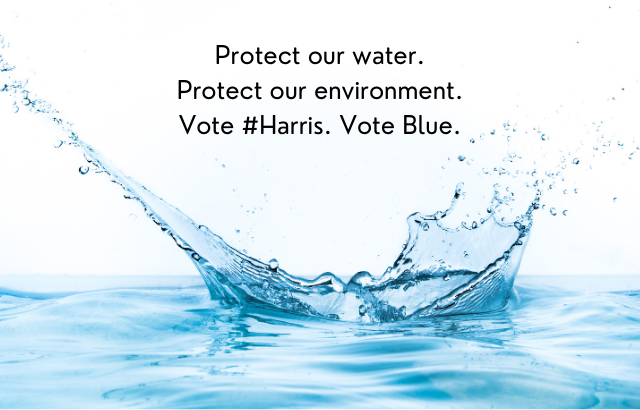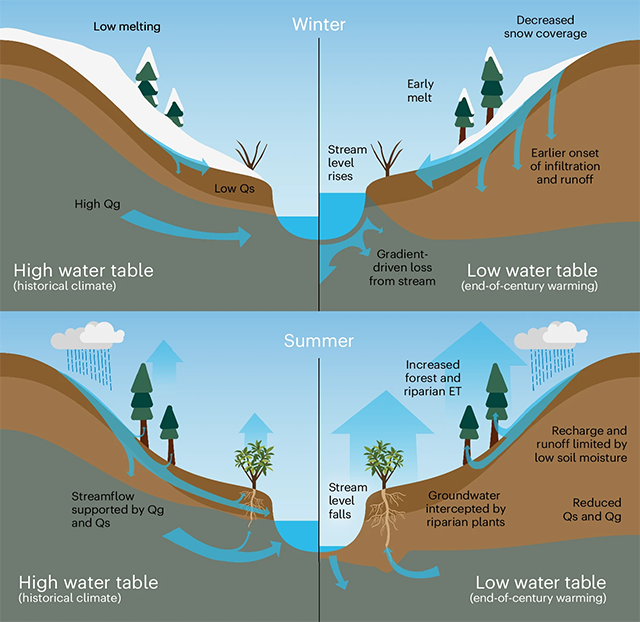
Splash of a drop of clean water with text that reads: “Protect our water. Protect our environment. Vote #Harris. Vote Blue.
Project 2025 envisages a conservative restructuring of the EPA that prioritizes industrial and business interests over the need for clean water and air, putting communities at risk, especially those near industrial zones. Project 2025 undermines the agency’s ability to protect diverse communities and uphold the human right to clean water. Reject Trump. Vote Blue.
Decentralization and Reduced Federal Oversight
Earlier this year, on April 10, 2024, the Biden-Harris Administration finalized the first-ever national drinking water standard to protect against PFAS, alongside announcing nearly $1 billion from the “Investing in America” agenda to combat these contaminants in public systems and private wells. This landmark initiative, benefiting around 100 million people, aims to significantly reduce illnesses and deaths associated with PFAS exposure, which have been linked to severe health problems including cancers and liver damage.
Project 2025 undermines these advances and instead create a patchwork of environmental standards. States with fewer resources or less governance resolve will fail to adequately protect water quality, which disproportionately affects vulnerable communities that rely on strong federal standards to safeguard their environment. Reject Trump. Vote Blue.
Cutting Back on Regulatory Authority
Project 2025 foretells a reduction in the breadth of the EPA’s authority to regulate, allowing polluters to operate with less scrutiny. This will lead to increased water contamination incidents, similar to the Flint water crisis, disproportionately impacting marginalized communities.
By focusing on reducing the EPA’s regulatory reach and emphasizing cost-effective solutions over comprehensive environmental protections, essential safeguards are weakened, especially those that prevent industries from polluting water sources. Reject Trump. Vote Blue.
Redefinition of Scientific and Risk Assessment Standards
The push for open-source science and revising scientific advisory roles dilutes scientific rigor in decision-making if it is driven by political considerations rather than unbiased scientific inquiry. This results in standards that fail to adequately protect against contaminants known to harm human health. The move toward risk-based regulation overlooks long-term and cumulative impacts of exposure to pollutants. Reject Trump. Vote Blue.
Limiting Legal Recourse
Project 2025 reduces the EPA’s enforcement and compliance capabilities, restricting individuals and communities’ ability to hold polluters accountable through legal action. By delegating more authority to state and local levels, it weakens the uniformity and strength of enforcement across regions and diminishes the legal empowerment of affected communities to sue for enforcement and compliance. This shift erodes a key check on corporate and governmental accountability in environmental protection. Reject Trump. Vote Blue.
Human Right to Clean Water
Clean water is a fundamental human right recognized by the United Nations. Any weakening of water quality standards or reduction in enforcement capability jeopardizes this right, particularly for the most vulnerable populations. Effective protection of water sources is essential not just for health but for the dignity and well-being of all individuals.
Communities of color, indigenous communities, and low-income populations often face the brunt of environmental degradation and are the most affected by policies that do not prioritize robust environmental protections. Ensuring their right to clean water requires strong federal oversight and stringent, uniformly applied environmental regulations. Reject Trump. Vote Blue.
Summing Up
Project 2025 proposes a conservative restructuring of the EPA that places industrial and business interests ahead of the imperative for clean water and air, potentially endangering communities. Project 2025 undermines the EPA’s capacity to safeguard diverse communities and the human right to clean water by favoring economic considerations over environmental and public health protections, exacerbating existing inequalities and environmental justice issues, necessitating the maintenance of robust federal oversight and stringent environmental standards. Reject Trump. Vote Blue.


